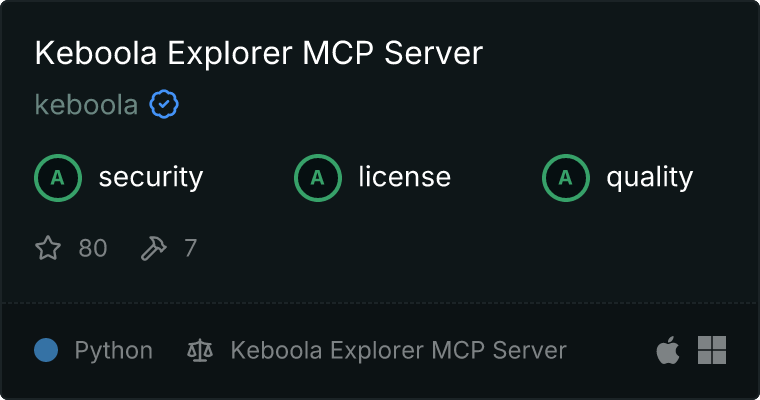Keboola MCP Server




A Model Context Protocol (MCP) server for interacting with Keboola Connection. This server provides tools for listing and accessing data from Keboola Storage API.
Requirements
- Keboola Storage API token
- Snowflake Read Only Workspace
Note: The Snowflake package doesn't work with the latest version of Python. If you're using Python 3.12 and above, you'll need to downgrade to Python 3.11.
Installation
Installing via Smithery
To install Keboola Explorer for Claude Desktop automatically via Smithery:
npx -y @smithery/cli install keboola-mcp-server --client claude
Manual Installation
First, clone the repository and create a virtual environment:
git clone https://github.com/keboola/keboola-mcp-server.git
cd keboola-mcp-server
python3 -m venv .venv
source .venv/bin/activate
Install the package in development mode:
pip3 install -e .
For development dependencies:
pip3 install -e ".[dev]"
Claude Desktop Setup
To use this server with Claude Desktop, follow these steps:
- Create or edit the Claude Desktop configuration file:
* **macOS** : `~/Library/Application Support/Claude/claude_desktop_config.json`
* **Windows** : `%APPDATA%\Claude\claude_desktop_config.json`
- Add the following configuration (adjust paths according to your setup):
{
"mcpServers": {
"keboola": {
"command": "/path/to/keboola-mcp-server/.venv/bin/python",
"args": [
"-m",
"keboola_mcp_server.cli",
"--log-level",
"DEBUG",
"--api-url",
"https://connection.YOUR_REGION.keboola.com"
],
"env": {
"KBC_STORAGE_TOKEN": "your-keboola-storage-token",
"PYTHONPATH": "/path/to/keboola-mcp-server/src",
"KBC_SNOWFLAKE_ACCOUNT": "your-snowflake-account",
"KBC_SNOWFLAKE_USER": "your-snowflake-user",
"KBC_SNOWFLAKE_PASSWORD": "your-snowflake-password",
"KBC_SNOWFLAKE_WAREHOUSE": "your-snowflake-warehouse",
"KBC_SNOWFLAKE_DATABASE": "your-snowflake-database",
"KBC_SNOWFLAKE_SCHEMA": "your-snowflake-schema",
"KBC_SNOWFLAKE_ROLE": "your-snowflake-role"
}
}
}
}
Replace:
/path/to/keboola-mcp-server with your actual path to the cloned repositoryyour-keboola-storage-token with your Keboola Storage API tokenYOUR_REGION with your Keboola region (e.g., north-europe.azure, etc.). You can remove it if you region is just connection explicitlyyour-snowflake-account with your Snowflake account identifieryour-snowflake-user with your Snowflake usernameyour-snowflake-password with your Snowflake passwordyour-snowflake-warehouse with your Snowflake warehouse nameyour-snowflake-database with your Snowflake database nameyour-snowflake-schema with your Snowflake schema nameyour-snowflake-role with your Snowflake role name
Note: If you are using a specific version of Python (e.g. 3.11 due to some package compatibility issues), you'll need to update the command into using that specific version, e.g. /path/to/keboola-mcp-server/.venv/bin/python3.11
Note: The Snowflake credentials can be obtained by creating a Read Only Snowflake Workspace in your Keboola project (the same project where you got your Storage Token). The workspace will provide all the necessary Snowflake connection parameters.
- After updating the configuration:
* Completely quit Claude Desktop (don't just close the window)
* Restart Claude Desktop
* Look for the hammer icon in the bottom right corner, indicating the server is connected
Troubleshooting
If you encounter connection issues:
- Check the logs in Claude Desktop for any error messages
- Verify your Keboola Storage API token is correct
- Ensure all paths in the configuration are absolute paths
- Confirm the virtual environment is properly activated and all dependencies are installed
- Make sure the PYTHONPATH points to the
src directory
Cursor AI Setup
To use this server with Cursor AI, you have two options for configuring the transport method: Server-Sent Events (SSE) or Standard I/O (stdio).
- Create or edit the Cursor AI configuration file:
* Location: `~/.cursor/mcp.json`
- Add one of the following configurations (or both) based on your preferred transport method:
Option 1: Using Server-Sent Events (SSE)
{
"mcpServers": {
"keboola": {
"url": "http://localhost:8000/sse?storage_token=YOUR_STORAGE_TOKEN&snowflake_account=YOUR_ACCOUNT&snowflake_user=YOUR_USER&snowflake_password=YOUR_PASSWORD&snowflake_database=YOUR_DATABASE&snowflake_schema=YOUR_SCHEMA&snowflake_warehouse=YOUR_WAREHOUSE"
}
}
}
Option 2: Using Standard I/O (stdio)
{
"mcpServers": {
"keboola": {
"command": "/path/to/keboola-mcp-server/venv/bin/python",
"args": [
"-m",
"keboola_mcp_server.cli",
"--transport",
"stdio"
],
"env": {
"KBC_STORAGE_TOKEN": "your-keboola-storage-token",
"KBC_SNOWFLAKE_ACCOUNT": "your-snowflake-account",
"KBC_SNOWFLAKE_USER": "your-snowflake-user",
"KBC_SNOWFLAKE_PASSWORD": "your-snowflake-password",
"KBC_SNOWFLAKE_DATABASE": "your-snowflake-database",
"KBC_SNOWFLAKE_SCHEMA": "your-snowflake-schema",
"KBC_SNOWFLAKE_WAREHOUSE": "your-snowflake-warehouse"
}
}
}
}
Replace all placeholder values (YOUR_*) with your actual Keboola and Snowflake credentials. These can be obtained from your Keboola project's Read Only Snowflake Workspace.
After updating the configuration:
- Restart Cursor AI
- The MCP server should be automatically detected and available for use
Available Tools
The server provides the following tools for interacting with Keboola Connection:
- List buckets and tables
- Get bucket and table information
- Preview table data
- Export table data to CSV
- List components and configurations
Development
Run tests:
pytest
Format code:
black .
isort .
Type checking:
mypy .
License
MIT License - see LICENSE file for details.
